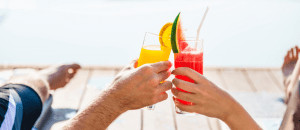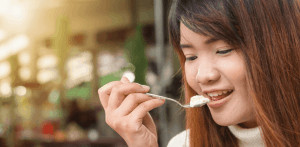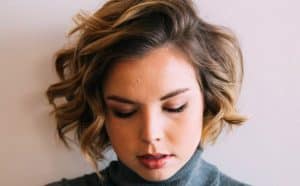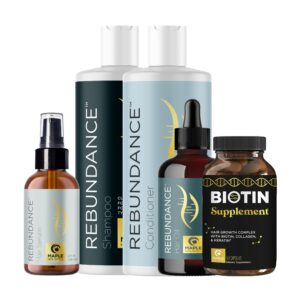Foods That Cause Hair Loss: What You Need To Know

When you were younger, maybe you thought that your hair would stick around forever. Perhaps it was your assertion that your hair would be yours, to have and to hold, to brush and to comb, to care for in sickness and in health, until… well, that’s just it. Hair loss – it happens. And sometimes it happens more rapidly because of poor eating habits. This is an article revolving around foods that can contribute to hair loss.
Just to be clear, these foods don’t flat out cause hair loss. But you won’t be doing your mane any favors if you regularly consume an unhealthy food pyramid. Those late night sessions of pizza, beer, and peanut butter crunch may not be the best or most highly recommended thing for your hair strands. Ah, memories. I miss being single. But I digress…
I’m not saying that all food is off the table (rimshot!). But if you want to keep your hair in mint condition, so to speak, you need to consume the right kinds of substances. And you need to make sure you absorb the proper nutrients. We ran an article on the top foods which promote hair growth. The words “you are what you eat” – which open that post – ring true in the opposite scenario as well.
And now, without further ado, here is our short list of foods that can act as catalysts for hair loss.
Alcohol Abuse

Limiting your alcohol intake may help your body absorb nutrients necessary for healthy hair.
Homer Simpson once saluted alcohol for being “the cause of, and solution to, all of life’s problems”. Far be it from me to doubt the venerable Mr. Plow for a second. Seeing as how alcohol has indeed been the cause of many joyful and sorrowful moments in my life, I suspect he has a point. So how does it all relate to hair?
Alcohol is not directly responsible for any type of alopecia (hair loss). Unless somebody pulled the ol’ switcheroo on you, there is nothing in that bottle of hooch that will make your hair fall out willy-nilly. However, alcohol abuse has plenty of consequences. One of them is the possibility of acquiring serious nutrient deficiencies. Sometimes these deficiencies include a lack of nourishing substances which the human body does not produce. If you fail to consume those essentials, that could mean trouble down the line.
Heavy drinkers may suffer from poor dietary habits and malabsorption due to their condition. Alcohol doesn’t cause hair to fall out. But it does create problems with absorbing nutrients, some being the ones responsible for keeping the hair in good shape. Even some moderate drinkers may experience this kind of backlash. This can make it difficult for the body to maintain and properly manage the scalp and its hair follicles.
Alcohol has also been linked to thyroid problems. When you have issues with your thyroid gland, it can potentially affect your body’s entire hormone system. Your hormones are the body’s messengers, and they regulate a great many processes. One of these processes is hair growth and hair shedding.
Dairy

The jury’s still out on whether or not dairy is good for your hair.
I find there are many reasons for not wanting to consume dairy products. Without even touching on the moral issues surrounding the dairy industry, the mere fact that dairy is hinted at as contributing to the onset of a variety of conditions is enough for me. Does cow’s milk affect hair? If so, how?
This is a highly controversial point. Some maintain that dairy is actually good for you and your hair. This is because very often, dairy products will contain nutrients which are known to be of the hair-strengthening variety (e.g. biotin, trace minerals, and healthy fatty acids). There are even DIY hair masks which specifically call for cow’s milk in their recipes.
The dairy which comes into question is less the straight-up cow’s milk, and more the industrial, ultra-pasteurized version which is available commercially. The pasteurization process changes the milk’s composition. And it makes it more difficult for the body to digest and absorb it. That means many of the supposed benefits and nutrients which can be found in dairy products might be lost or lessened.
The question of dairy remains unanswered for now. But it still makes this list because of the controversy surrounding it. More studies need to be conducted before there is any kind of definitive answer. Until then, some will keep supporting its daily consumption, while others will continue to oppose it fervently.
Also, let’s not forget that some people are extra sensitive to dairy components, while others are not in the least. Dairy could be beneficial for one person’s scalp and hair and produce negative results for another. At this time, it’s not possible to make any kind of sweeping statement.
Try it. If you are thinning out or shedding, consider staying away from dairy for several months as a trial.
Sugary Cereals and Snacks

Passing on the candy can help keep your hair and your body healthy.
Boy, this is quickly becoming a slightly frightening list, isn’t it? I mean, I love sugary cereal and snacks, and I have always been more of a sweet tooth. Alright… let’s hear it: what’s the deal with sugar and hair?
Sugar – and particularly the over-consumption of sugar – has already been linked to some serious conditions. These studies are all pointing in the same direction: don’t. So, regardless of your luscious locks, keeping your sugar levels in check is paramount, and is always recommended. You don’t want to risk acquiring any form of diabetes or another sugar-related condition.
As for sugar and hair, there are studies which have demonstrated a connection between sugar consumption and increased (or accelerated) hair loss. More studies will undoubtedly be conducted, and there is no doubt that we will know more and be much wiser in a few years’ time. The evidence so far is not conclusive, but nonetheless it is something to think about.
The consumption of sugar has an affect on our body’s production of dihydrotestosterone (DHT). This is the hormone responsible for hair growth and (later on) hair loss. What changes along the way is the manner in which the hair follicles interact with the DHT. At first the male sex hormone testosterone was the main suspect in hair loss. But turns out it is sensitivity to DHT, a derivative of testosterone, which takes the major blame.
Once the hair follicles are made sensitive to its presence – and this happens for reasons unknown as of yet – DHT becomes the bane of their existence. It’s seen as the main catalyst in pattern hair loss, aka androgenetic alopecia, in men and women.
Sodas and Other Sweet Drinks

It’s healthiest to limit your soda consumption as much as possible.
Carbonated, sweetened beverages can be found in countless homes across the US and all over the world. I grew up with them, I loved them dearly, and I am well aware of their allure. Research has already demonstrated the potentially harmful consequences of regular consumption of sodas and other sweet drinks. It’s drawn connections between soda drinks and obesity, tooth decay, and even osteoporosis and cardiovascular diseases. A widely arrayed spectrum of problems, to say the least.
The possible connection to hair loss is still being investigated, and the evidence is not as concrete as some would want to believe. But don’t reach for that six pack of Pepsi quite yet, sunshine. Strong evidence or not, it’s clear that overloading your system with sugar (or aspartame), caffeine, and phosphoric acid is far from desired. You may want to cut down or quit it altogether, because science.
The main claim of those who oppose carbonated beverages is that they make it more difficult for the body to balance itself out hormonally. Disruptions in the system can be caused by a number of ingredients which are often found in those types of drinks, and hormonal imbalance is often cited as a contributing factor to pattern hair loss. This makes even more sense considering the role which DHT plays in the process.
Moderation is Key

Part of our hair health simply depends on genetics.
This may be the most important section of this post. You could spend your life in a sheltered environment, drinking only water, eating right, and exercising properly, and still some awful thing may befall you – a physical illness or something else that knocks the wind out of you. In the Tao Te Ching, Lao Tzu wrote that a significant percentage of the world’s population will wind up dead because of their immoderate pursuit of health. Ironic.
Moderation is a key principle in leading a good life, and I feel that is a fair statement. If you are so inclined, you should feel free to indulge in dairy and sodas, or to enjoy an alcoholic drink now and then, and to not become too entangled in your own webs of health and wellness. Moderation is what will provide the balance. As you grow, so will your conception of what that moderation actually is, and what constitutes decent amounts of, well, anything and everything that you possess, consume, or imbibe.
You could live your life staying away from “bad” food and drink, consuming only “hair-friendly” things, taking the recommended supplements, undergoing frequent scalp massages – and still find that you lose all of your hair by the time you hit 30. This is because of your genes and family history. You never know. Which is why it’s best to not limit yourself in any harsh way. Rather, be aware and employ the key of moderation.
Rebundance Bundle Breakdown

Rebundance for hair loss.
Looking for a plant-based hair care system dedicated to preventing and combating hair loss? Take a look at our Men’s and Women’s Rebundance bundles. A collection which includes shampoo, conditioner, hair oil, hair serum and biotin supplement.
The shampoo and conditioner in this bundle are designed for everyday use. Keep in mind it’s not usually recommended to wash your hair every single day. Give your scalp and hair time to adjust and find their rhythm. Washing a couple of times a week and engaging in weekly oil treatments is the way to go. Combined with a daily biotin supplement, what Rebundance offers is a real game-changer which can work wonders for the condition of your scalp and hair.
You can look and feel your best. Can become more confident and vivacious. You can stand in front of the mirror, run your hands or hairbrush through your hair, and not fear what might come falling out. You can shower with peace of mind and tranquility, without being apprehensive about looking down at the drain at the end of it. No more excessive shedding on your pillow, no more anxiety over thinning hairs and receding lines.
Fuller, thicker, more nourished hairs. Our lightweight aromatherapeutic hair oil can be applied to wet or dry hair, for assistance in hydrating and detangling. The hair serum can be applied directly on the scalp to increase the flow of blood to the area. Or it can be used on the mid-lengths of the strands to their ends, for extra volume and care. The serum can be rinsed out after a short time, or it can be left in overnight.
Conclusion

You can speak to a dietitian if you want to go the extra step in ensuring healthy, full hair.
It is highly conceivable that someday soon, science will be able to provide us with more detailed information on food and hair loss. Right now, though, there aren’t any cast-iron laws or guarantees in regards to food and alopecia. That’s because it depends on many factors other than food. Things like general health (or lack thereof), age, sex, genes, lifestyle, diet, stress and anxiety, medication and its side effects, and more.
Food may not be a direct contributor to hair loss, but it is considered an indirect contributor. If you want to know where you stand, make an appointment with your physician, undergo a blood test, and see if there are any looming deficiencies or conditions you need to be aware of.
Consider speaking to a dietitian about implementing eating habits which are tailored to your wants and needs. The best defense is a good offense. The sooner you begin practicing a healthier diet and lifestyle, the better chance you have of staving off any future hair loss.
Dairy, sugar, artificial sweeteners, carbon dioxide, alcohol – they have their time and place. It’s on you to regulate the use of such foods and beverages and see that you make a conscious effort not to over-indulge. Each of those substances also has benefits alongside its drawbacks, so it’s not as if they are evil in some way. More like… misunderstood.
There are no foods that cause your hair to fall out. But there are foods that beg you pay closer attention to what it is that you are putting into your body.


